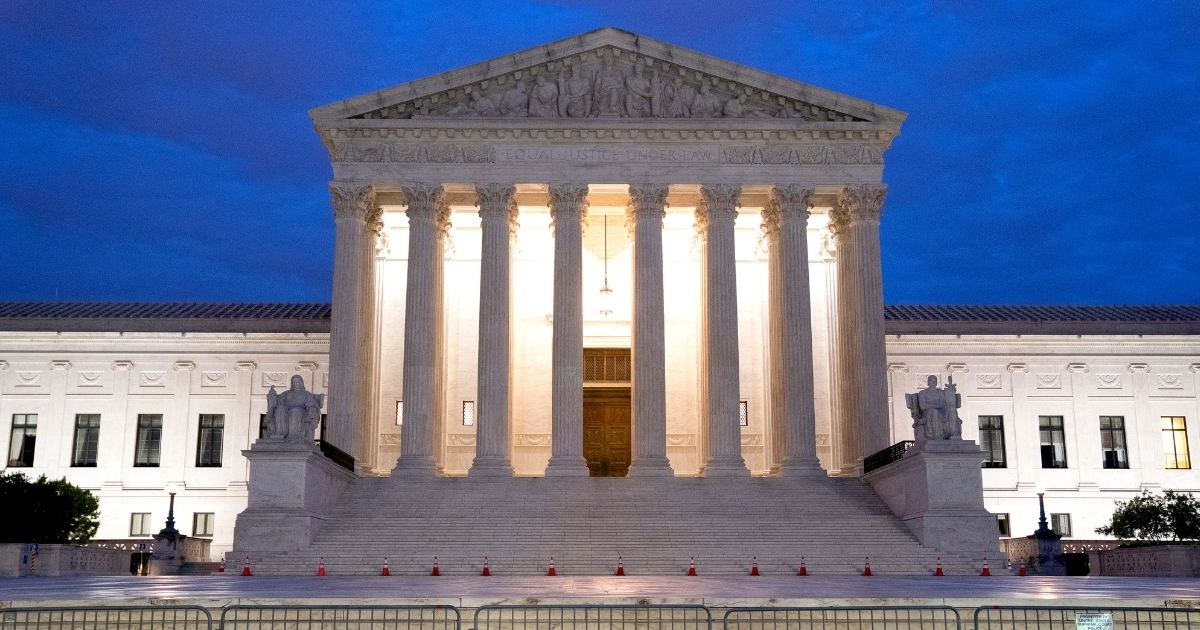
Supreme Court Rules in Favor of Illegal Alien Over a Single-Word Technicality
On Thursday, the Supreme Court ruled in favor of an illegal alien in a deportation case based on a single word in a federal law.
Federal immigration law states that an illegal alien “may be eligible for discretionary relief if, among other things, they can establish their continuous presence in the country for at least 10 years.”
However, the “stop-time rule” provides that “the period of continuous presence ‘shall be deemed to end . . . when the alien is served a notice to appear’ in a removal proceeding.”
The Court ultimately determined that the written notice must include “the charges against the alien and the time and place at which the removal proceedings will be held … A notice that omits any of this statutorily required information does not trigger the stop-time rule.”
Agusto Niz-Chavez entered the U.S. illegally in 2005. He currently resides in Michigan with his family, according to Reuters.
Fox News reported that in March 2013, Niz-Chavez received a notice which listed the charges against him and a second notice in May 2013 which provided the time and place of his hearing.
The government’s case against Niz-Chavez makes the claim that “because the two documents collectively specified all statutorily required information for ‘a notice to appear,’ [his] continuous presence in the country stopped when he was served with the second document.”
The Supreme Court, however, didn’t see it that way and ruled in Niz-Chavez’s favor by a vote of 6 to 3. The conservative justices were split on the decision.
The law states that the period of continuous presence ends when the alien is served a notice that includes both the charges and the time and place of the hearing. Niz-Chavez had received this information in two notices. Therefore, the stop-time rule was not triggered and Niz-Chavez is deemed to have had a continuous presence in the U.S. for more than ten years.
Justice Neil Gorsuch delivered the court’s opinion. He was joined by Justices Clarence Thomas, Stephen Breyer, Sonia Sotomayor, Elena Kagan and Amy Coney Barrett.
“At one level, today’s dispute may seem semantic, focused on a single word, a small one at that. But words are how the law constrains power,” he wrote.
“In this case, the law’s terms ensure that, when the federal government seeks a procedural advantage against an individual, it will at least supply him with a single and reasonably comprehensive statement of the nature of the proceedings against him.”
“At first blush, a notice to appear might seem to be just that — a single document containing all the information an individual needs to know about his removal hearing. But, the government says, supplying so much information in a single form is too taxing.
“It needs more flexibility, allowing its officials to provide information in separate mailings (as many as they wish) over time (as long as they find convenient). The question for us is whether the law Congress adopted tolerates the government’s preferred practice.”
Justice Brett Kavanaugh wrote the dissent. He was joined by Chief Justice John Roberts and Justice Samuel Alito. “I find the Court’s conclusion rather perplexing as a matter of statutory interpretation and common sense,” he said.
“The Court today casts aside the Immigration Judge’s order and allows Niz-Chavez to go back to immigration court to seek cancellation of removal. Why?” Kavanaugh asked in his dissent.
“The Court says that Niz-Chavez did not receive proper notice of his removal proceedings because he received notice in two documents rather than one.”
“The Court so holds even though Niz-Chavez (i) received all the statutorily required information about his removal proceedings, including the time and place of the removal hearing; (ii) was not prejudiced in any way by receiving notice in two documents rather than one; and (iii) in fact appeared with counsel at his scheduled removal hearing.”
Reuters spoke to Cornell University immigration law professor Stephen Yale-Loehr who said this decision “does give [long-term illegal aliens] a second chance to try to prove that they qualify for cancellation of removal and other forms of relief.”
This ruling will no doubt serve as a precedent in countless other deportation cases in which the letter of the law is not followed.
If only the Supreme Court had been so interested in the letter of the law when it allowed state judges and other officials to bypass state legislatures to change state election laws last year.
Truth and Accuracy
We are committed to truth and accuracy in all of our journalism. Read our editorial standards.
Advertise with The Western Journal and reach millions of highly engaged readers, while supporting our work. Advertise Today.












